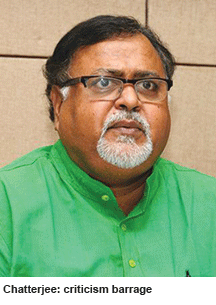IN A MINOR reshuffle of ministers on May 27, Mamata Banerjee, the mercurial chief minister of West Bengal (pop. 91 million), fired two ministers and changed the portfolios of two others. The reshuffle aroused special interest in the state’s academy because Bratya Basu, the high profile education minister of the ruling Trinamool Congress (TMC) government which was elected in 2011, has been shifted to the innocuous tourism ministry while Partha Chatterjee, a political heavyweight and Banerjee’s close associate and hitherto minister for information technology, has been allocated the education portfolio. The reshuffle is being interpreted as Banerjee’s displeasure with the ousted and transferred ministers for the party’s “poor performance” in their constituencies in the 2014 Lok Sabha polls, although TMC won an unprecedented 34 (out of 42) Lok Sabha seats in West Bengal.
 But immediately after his appointment as education minister, Chatterjee ran into a barrage of criticism from academia and opposition parties for taking a decision to revoke the online admission system, made mandatory for state government-funded colleges and universities from the new academic year (starting July), and making it optional. Chatterjee’s excuse: inadequate technology/infrastructure of government colleges.
But immediately after his appointment as education minister, Chatterjee ran into a barrage of criticism from academia and opposition parties for taking a decision to revoke the online admission system, made mandatory for state government-funded colleges and universities from the new academic year (starting July), and making it optional. Chatterjee’s excuse: inadequate technology/infrastructure of government colleges.
In February, former education minister Basu had announced that the online system would be introduced this year in all universities, including West Bengal State, Burdwan, Kalyani and North Bengal universities and their affiliated colleges. The prime purpose of switching to online admissions was to curb widespread malpractices including tampering with manually compiled college admission lists processed in multiple locations.
According to Prithwis Mukherjee, programme director of business analytics at the Praxis Business School, Kolkata, online admission systems, which are de rigueur in all major universities in India and abroad, are more transparent and less vulnerable to manipulation and tampering. “Once posted online, admission lists and supportive documentation become public record leaving a paper trail which makes them very difficult to alter or amend. Online admission systems promote transparency and convenience. That’s why respectable education institutions world over have switched to them,” says Mukherjee, an alumnus of IIT-Kharagpur and University of Texas, Austin, who acquired 18 years of business experience with several IT majors (IBM India, PwC India, Tata Information Systems) before signing up with Praxis Business School (estb. 2007) in 2013.
Yet within 48 hours of taking charge of the education ministry on May 27, and being briefed that his predecessor had finalised centralised online admission systems for 20 state universities in West Bengal, Chatterjee announced that online admissions are optional this year and would become compulsory only in the academic year 2015-16. “We are not ready with the required software as yet. Moreover, many colleges do not have connectivity,” Chatterjee said in an interview with indiatoday.in (May 30).
The TMC government’s volte face was sharply criticised by the Left Front and BJP spokespersons. “The online admissions system has been dropped because TMC youth leaders don’t like it. With the old system back, once again touts and agents will be able to mint money by manipulating admissions through unscrupulous means,” says Rahul Sinha, president of the state BJP.
When shortly after Banerjee’s TMC swept the West Bengal assembly election of May 2011, ending 34 years of rule of the Communist Party of India-Marxist (CPM)-led Left Front government in the state, and quickly enacted the West Bengal University Laws (Amendment) Bill, 2011 to transform higher education, academics hailed it as an overdue initiative to end pervasive political meddling in higher education. But three years later with TMC-affiliated students’ unions following the example of their CPM counterparts, and interfering with faculty appointments and disrupting admission processes in colleges and universities, there’s widespread disillusionment.
Most academics in the state are agreed that the TMC government is following in the footsteps of the ousted Left Front whose leaders and cadres ruined West Bengal’s once envied higher education system. “The about-turn on online admissions is a retrograde step. It’s shameful we are still debating the online connectivity issue in higher education in the 14th year of the 21st century,” says Mukherjee.
For West Bengal’s beleaguered academy, the CPM tragedy is being followed by TMC farce.
Baishali Mukherjee (Kolkata)